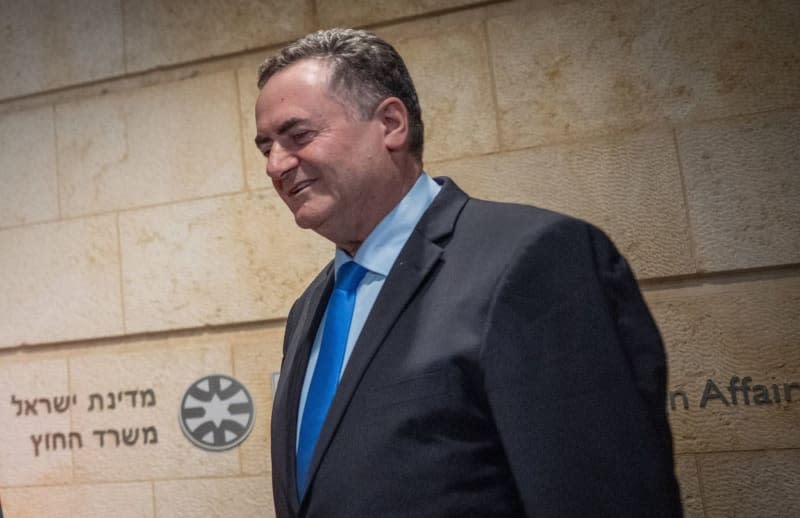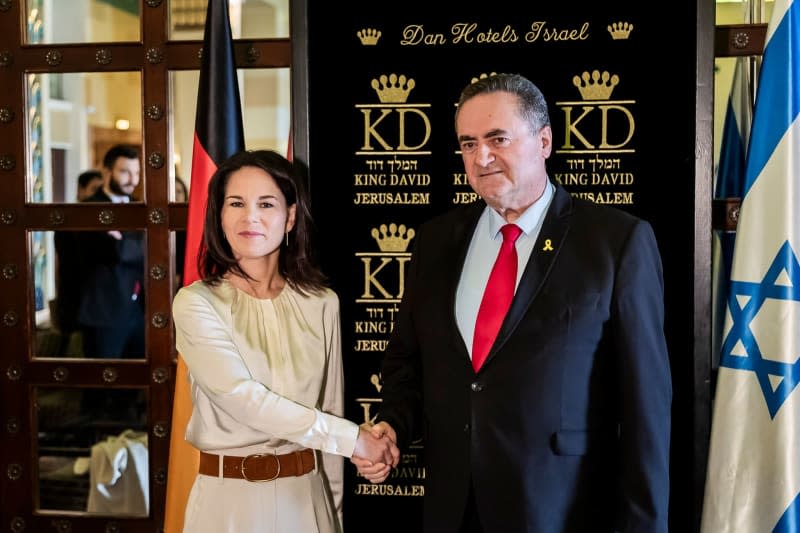Israel's foreign minister says UN ceasefire vote helps Hamas

- Oops!Something went wrong.Please try again later.
The UN Security Council's demand for an immediate ceasefire in Gaza has strengthened the Palestinian militant Hamas movement and prompted it to reject a US compromise proposal on a new hostage deal, Israeli Foreign Minister Israel Katz said on Tuesday.
Katz, speaking to Israeli Army Radio, said he was disappointed that the United States had not vetoed the resolution.
"We expect friends to strengthen us in these difficult times and not weaken us against Hamas and all the other enemies," Katz said. The US should veto "any decision that does not strongly condemn the terrible massacre and sexual crimes committed by Hamas against babies, women, girls and the elderly" on October 7, he added.
In a resolution binding under international law, the UN Security Council called for an "immediate ceasefire" in the Gaza Strip on Monday for the first time since the start of the war. In addition, the most powerful body of the United Nations is demanding the immediate and unconditional release of all hostages held by Hamas.
Prior to this, Israeli negotiators had accepted a compromise proposal from US mediators in the Qatari capital Doha and hoped Hamas would agree.
Following the UN Security Council's decision, however, Hamas announced that it was insisting on its demand for a comprehensive ceasefire, including a complete Israeli withdrawal from the Gaza Strip.
This proves that the resolution has played into the hands of Hamas, said Katz. The Islamist terrorist organization was counting on Israel being stopped by the international community without Hamas having to make any concessions, he said. The decision led to a hardening of the Hamas position on releasing hostages, he added.
"The vote yesterday was a mistake, morally and practically," said Katz. Hamas had "received the message that it doesn't have to hurry, there is another way." However, Israel will continue its military operation in the Gaza Strip unperturbed, including the offensive in the city of Rafah in the south of the coastal strip, he said.
German Foreign Minister Annalena Baerbock, who met Katz on Tuesday, welcomed the appeal by the international community for a ceasefire as long overdue. The call for the release of all hostages in Gaza and for more aid for the suffering civilian population was also important, she said.
Israeli President Isaac Herzog sees Hamas leader Yehya al-Sinwar as the lynchpin in the Gaza war and key to getting Israel's hostages held in the Gaza Strip released.
"In the end, there is no choice," Herzog said in Jerusalem on Tuesday. "We must continue the fight and we must get to Sinwar - either alive or dead - so that we can see the hostages back home."
Herzog said the reality is clear: "Everything begins and ends with Yehya Sinwar.
"He's the one who decided on the October massacre.
"He's been seeking to shed the blood of the innocent ever since.
"It is he who aims to escalate the regional situation, to desecrate Ramadan, to do everything to shatter coexistence in our country and in the whole region, to sow discord among us and around the world."
Gaza's children and young people are becoming increasingly desperate for food, according to the UN children's relief organization UNICEF.
The hospitals were full of completely emaciated children and the few functioning incubators were full of premature babies whose lives were hanging by a thread, James Elder, UNICEF's spokesman said in the Gaza Strip, said on Tuesday.
The hunger crisis in the Gaza Strip is "man-made," Elder said. Hundreds of lorries with food are waiting at the borders, but are not allowed to enter. "Life-saving aid is being obstructed, dignity is being denied," he said.
Elder appealed to the Israeli authorities to open border crossings in the north. This could end the hunger crisis within a few days, he said.
The UN Relief and Works Agency for Palestinians (UNRWA), said Israel is currently refusing entry authorization to all its convoys.
A representative of the Israeli military authority, which is coordinating the emergency aid, said last week in Geneva that there was no restriction on aid convoys. The problem is rather in the Gaza Strip, because the actors there are apparently not in a position to bring material to the people.
The UN Office for the Coordination of Humanitarian Affairs (OCHA) said on Tuesday in Geneva that it was Israel's duty as a party to the conflict to ensure that food for the civilian population could be distributed without restriction.
At least two people were killed in an Israeli airstrike that hit a house in southern Lebanon overnight, state-media reported on Tuesday.
According to the Lebanese State Agency (NNA), the attack took place in the border town of Mais al-Jabal.
Israel's army announced late on Monday that it had attacked a Lebanese Hezbollah militia position in the area of Mais al-Jabal.
Hezbollah confirmed the strike and later announced one of its fighters was killed, raising the death toll among its ranks to 242 since the violence started on the Lebanese-Israeli border on October 8.


